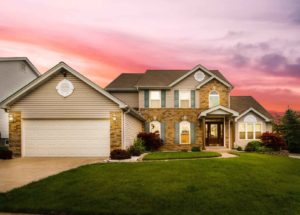YOUR homeowner’s POLICY
 Your home is one of your most valuable assets. Choosing the right homeowner’s insurance policy to protect your home can make a big difference in your life if something unexpected happens. A homeowner’s policy can protect against damage to your house as well as damage to the contents inside your home—your personal possessions.
Your home is one of your most valuable assets. Choosing the right homeowner’s insurance policy to protect your home can make a big difference in your life if something unexpected happens. A homeowner’s policy can protect against damage to your house as well as damage to the contents inside your home—your personal possessions.
Homeowners coverage combines two types of coverage:
- Coverage against your property being destroyed or damaged by certain perils, such as fire, theft and windstorm
- Coverage for liability exposure – for example, someone being injured on your property
For examples, if there is a fire or burglary, homeowners insurance will help pay for destruction and losses. In addition, a home insurance policy may also provide liability coverage for accidents that occur on your property (including both property damage and bodily injuries incurred by visiting guests) and may even cover certain accidents that occur off your property.
There are several different coverage types built into a home insurance policy, and it’s important to know what coverage types apply to what damages. Let’s get into the specifics.
What does homeowners insurance cover?
Now that you know the basic homeowners insurance definition, it’s important to understand what a standard policy actually covers. Homeowners insurance will help to cover perils such as :
|
|
While other hazards, such floods and earthquakes are not typically covered by standard policies, there are additional coverage options available. See our separate entry on Flood insurance.
Depending on the company, homeowner policies usually include:
Dwelling coverage
Dwelling coverage helps protect the structure, built-in appliances, flooring (including wall-to-wall carpet and tile), cabinetry of your house from damage. In the terms of your home insurance policy, your “dwelling” means the entire structure of your home and any connected structures such as an attached garage or cellar. In the event your home is damaged by a covered loss, this will help to cover repairs or any rebuilding that needs to take place as a result.
Personal property coverage
Personal property coverage protects your personal belongings in your home, such as furniture or electronics, if they are damaged or destroyed by a covered loss.
Other structures coverage
Other structures coverage applies to structures on your property that are not attached to your dwelling. If an unattached structure such as a shed, garage or guest house is damaged, other structures insurance may help cover the associated costs.
Liability coverage
Liability coverage may cover damage costs associated with bodily injuries sustained by guests on your property and other covered expenses that arise as a result of negligence. This could include the individual’s medical bills, loss of income, pain and suffering and more. It could also cover your legal defense costs in the event of a dispute.
Loss of use coverage
In the event you need to temporarily move out of your home due to a covered loss, loss of use insurance will cover additional housing and living expenses that you incur. For example, if you have to move out of your home while it is being repaired or rebuilt after a covered accident, loss of use insurance would cover the cost of a hotel, temporary apartment or house.
Depending on the value of your assets, you may want to augment your coverage with an Excess Liability Policy, also known as an Umbrella Policy that will provide additional liability protection.
